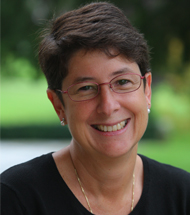ICS researcher Rocio Davis participates in Taiwan in the annual meeting of an international network of university institutes.
Representatives from 34 institutions from around the world spoke about the challenges of research institutes in a global world.

Rocío Davis, researcher at the Institute for Culture and Society of the University of Navarra and professor of the School of Philosophy and Lettersparticipated in the Third meeting UBIAS (University Based Institutes for Advanced Study), held in Taipei (Taiwan) from November 27 to 29.
The meeting, coordinated by the Institute of Advanced Studies in Humanities and Social Sciences of the National Taiwan University, was attended by representatives from 34 advanced programs of study institutes from universities around the world. It was held under the title degree scroll Breaking Through Boundaries and Old Paradigms in the New Age of Globalization and a special focus: Rising East Asia in the New Age of Globalization.
Rocío Davis, researcher at project 'Emotional culture and identity', which receives funding from Zurich Insurancewas one of the speakers at the roundtable 'Spotlight: Thinking from Latin America and Iberia', which also included Martin Grossmann, director of high school de programs of study Avanzados of the Universidade de Sao Paulo (Brazil); and José Vicente Tavares-Dos-Santos, of high school Latinoamericado de programs of study Avanzados of the Universidade Federal do Rio Grande do Sul (Brazil). The panel was moderated by Luisa Shu-Ying Chang, Dean of the Office of International Office of the National Taiwan University.
Latin America and the Iberian Peninsula in global scientific productionOver the course of four days, various panels and conferences were held. Among other topics, they addressed the contributions of thinking in East Asia, Latin America and the Iberian Peninsula to global scientific production; the potential of the network UBIAS; creativity and multidisciplinarity; models of cooperation between the institutes belonging to the network; the research leader in the field of natural sciences and technology in the institutes of programs of study advanced; and the importance of the social sciences and Humanities in the discussion of the most pressing issues.
The UBIAS meeting is held annually in order to share experiences, promote cultural and scientific exchanges, and articulate institutional agreements.
More information about the activity: http://dim.mickey.tw/marketing/
UBIAS: http://www.ubias.net/
